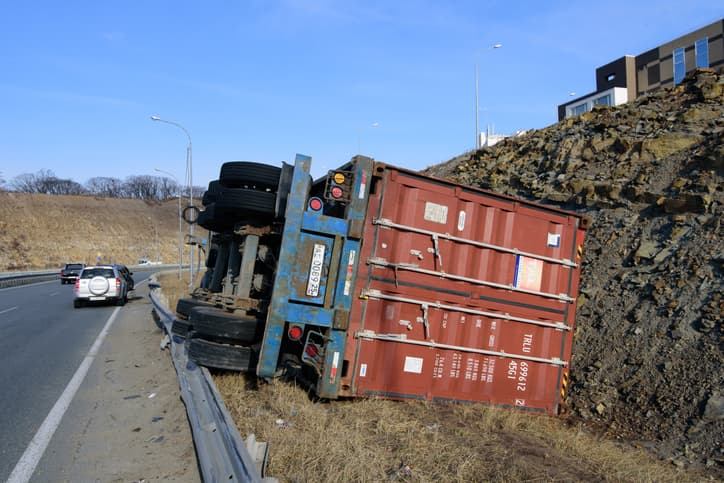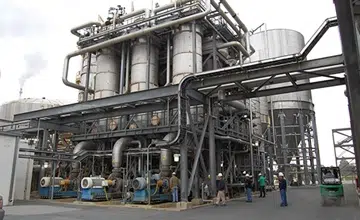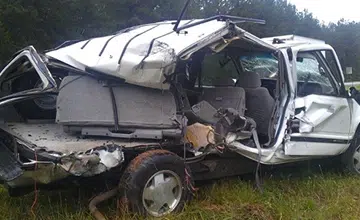Dedicated Truck Accident Attorneys in Marietta, Georgia
Georgia truck crash injuries are often severe due to the sheer size and weight of commercial trucks compared to passenger vehicles. When a truck, which can weigh up to 80,000 pounds, collides with a much smaller car, the impact force is significantly greater, leading to catastrophic injuries.
Victims may suffer traumatic brain injuries, spinal cord damage, broken bones, internal injuries, or even fatalities. Additionally, the higher speed of trucks on highways, combined with factors like longer stopping distances and the potential for cargo shifts, amplifies the risk of life-altering consequences. The severity of these injuries often results in prolonged medical treatment, rehabilitation, and substantial financial burdens for victims. We can help.

Partnering with our Marietta truck crash and injury attorneys immediately after a crash is crucial to ensure your rights are protected and your best interests are prioritized.
Trucking companies and their insurers often begin investigations right away, gathering evidence that could be used to minimize your claim or deny liability. From the outset, having an experienced attorney ensures that critical evidence—such as black box data, driver logs, and witness statements—is preserved and adequately analyzed.
Additionally, our Cobb County personal injury attorneys can handle all communications with insurance companies, preventing you from making statements that could jeopardize your claim. With Ashby Thelen Lowry as your legal representation, you can focus on your recovery while we fight for the compensation you deserve. Contact us today to learn more during a free consultation.
Truck Crash Data in Georgia: Why the Numbers Demand Legal Action
Commercial truck collisions remain one of the most dangerous threats on Georgia roadways. According to the Federal Motor Carrier Safety Administration (FMCSA), over 164,000 people were injured and approximately 5,000 were killed in large truck-related collisions nationwide in the most recent reporting year. Georgia is among the states with the highest number of fatalities, consistently ranking in the top ten for deadly truck-related crashes.
Closer to home, the Georgia Department of Transportation (GDOT) reports that more than 10,000 crashes involving commercial motor vehicles occur in Georgia each year. Cobb County, which includes Marietta, is a significant transportation corridor intersected by I-75, I-285, and U.S. Route 41, making it a hot spot for commercial freight traffic and truck-related injury claims.
What’s especially alarming is the severity of injuries associated with truck-related events. The FMCSA’s data shows that nearly three-quarters of those killed in crashes involving large trucks are occupants of smaller vehicles. These statistics support what many victims and families already know: the disparity in size and force between an 80,000-pound truck and a passenger car leaves little room for survival in high-speed collisions.
Driver fatigue, mechanical failures, and improper cargo loading lead to severe and fatal truck collisions in Georgia. According to the FMCSA, 13% of commercial drivers involved in deadly crashes were fatigued at the time of the incident, often due to pressure from employers to meet tight delivery schedules.
At Ashby Thelen Lowry, we rely on these data points not only to understand the scale of the harm our clients face but also to present compelling, evidence-backed cases that underscore the preventable nature of these tragedies. By contextualizing a victim’s injuries within broader statewide and national trucking safety data, we demonstrate how negligence fits into a larger and troubling pattern and why accountability is essential.
How is Liability Determined in Georgia Truck Accidents, Injuries, and Fatalities Cases?
In Georgia truck crashes, injuries, and fatalities cases, determining liability involves a detailed analysis of various factors to establish who is legally responsible for the crash. Liability can fall on multiple parties, such as the truck driver, trucking company, vehicle manufacturer, or third-party contractors.
Here’s a comprehensive breakdown of how liability is determined:
Truck Driver Negligence
One of the most common causes of truck crashes in Georgia is driver negligence.
Liability may rest on the truck driver if they engaged in unsafe practices such as:
- Distracted driving.
- Driving under the influence of alcohol or drugs.
- Driver fatigue, is often due to violating Hours of Service regulations, which limit how long drivers can be on the road without rest.
- Failure to follow traffic laws.
- Evidence such as driver logs, black box data, which records the truck’s speed and braking, and traffic camera footage can be crucial in proving driver negligence.
Trucking Company Liability
The trucking company can also be held liable in many instances, particularly if they:
- Fail to Properly Maintain their Fleet: Poorly maintained brakes, tires, or other mechanical components may contribute to collisions.
- Negligent Hiring Practices: If the company hires an unqualified driver or fails to check driving records and conduct background checks, they may be responsible.
- Failure to Train: If the company does not properly train drivers in safety protocols or handling dangerous cargo, this can also result in liability.
- Pressuring Drivers to Violate Hours of Service Regulations: Trucking companies may be liable if they pressure drivers to work long hours, leading to fatigue.
Third-Party Liability
In some cases, third-party contractors or maintenance companies can be liable. If an independent contractor performed faulty repairs or failed to inspect the truck properly, leading to a crash, they may be liable for their negligence.
Manufacturer Defects
The truck or part manufacturer may be liable if a defective part, such as brake failure, tire blowout, or steering malfunction, caused the crash. Proving manufacturer liability usually requires expert analysis and investigation into whether the defect was due to poor design or manufacturing errors.
Cargo Loaders
Improperly loaded or unsecured cargo can shift during transit, causing the truck to become unbalanced or overturn. In such cases, the individuals or companies responsible for loading the truck may share liability. This is particularly relevant when hazardous materials are involved, which require specific loading and handling procedures.
Multiple Liable Parties
Truck crashes are common in Georgia, and multiple parties often share liability. For example, the truck driver may be responsible for speeding, while the trucking company could be liable for forcing the driver to work excessive hours. In cases involving defective parts, the manufacturer might also share responsibility. Our Marietta truck crash attorneys will work to identify all potentially liable parties to maximize the compensation available to our clients. Contact us today to learn more about your legal rights and options for pursuing a claim.

How Do Federal and State Trucking Regulations Impact My Case?
Federal and state trucking regulations significantly impact truck crash cases, as they set strict standards for truck drivers, trucking companies, and their operations to ensure road safety. These regulations can determine liability, establish negligence, and support your claim.
Here’s how they impact your case:
- Driver Hours of Service (HOS) Regulations
The Federal Motor Carrier Safety Administration (FMCSA) enforces Hours of Service regulations, which limit how long a truck driver can be on the road without rest. Violations of these regulations, such as driving while fatigued due to exceeding allowable hours, can establish negligence if the driver’s fatigue contributed to the crash. Driver logs or electronic logging devices (ELDs) will be examined to determine compliance with HOS rules.
- Vehicle Maintenance and Inspection Requirements
Federal and state laws mandate regular inspections and maintenance of commercial trucks to ensure they are safe for operation. This includes brake checks, tire inspections, and other mechanical components. If a truck involved in a crash was improperly maintained or had mechanical issues, it could point to negligence on the part of the trucking company. Maintenance records, inspection reports, and repair histories are critical evidence in these cases.
- Weight and Cargo Regulations
Trucks are subject to weight limits and proper cargo loading regulations to prevent crashes caused by unbalanced or overloaded vehicles. Improperly loaded cargo or overloaded trucks can make the vehicle more challenging to control and prone to rollovers or jackknifes. Violations of these cargo and weight regulations can make the trucking company or cargo loaders liable for crashes.
- Drug and Alcohol Testing Requirements
Federal regulations require truck drivers to undergo drug and alcohol testing before hiring, after crashes, and randomly while employed. If a driver was under the influence of drugs or alcohol at the time of the crash, it’s a direct violation of these regulations, providing clear evidence of negligence. Failure to properly screen drivers for drug and alcohol use can also implicate the trucking company.
- Driver Qualification and Training Standards
Truck drivers must meet specific qualifications, including holding a valid Georgia Commercial Driver’s License (CDL) and completing necessary training. If the driver in your collision was not properly licensed, trained, or vetted, the trucking company could be held responsible for negligent hiring practices. Evidence of driver qualifications and background checks will be critical in proving liability.
- Speed and Distance Regulations
Due to the longer stopping distances required for large trucks, truck drivers are required to follow speed limits and maintain safe following distances. Violations of these safety regulations, such as speeding or tailgating, can be used as evidence of negligence. Black box data, traffic camera footage, and witness statements can help demonstrate speed and distance requirements violations.
- Record-Keeping and Compliance
Trucking companies are required by law to maintain detailed records, including driver logs, maintenance records, and compliance with safety regulations. Failing to keep accurate records or falsifying them violates federal laws and can be used to establish negligence. Our attorneys will likely request access to these records to ensure all safety standards are followed.
- Federal and State Interaction
Federal regulations set baseline safety standards for interstate trucking (trucks traveling between states), but each state, including Georgia, may have additional trucking regulations. Your case could involve violations of both federal and state laws, and understanding how these rules interact is essential for building a strong claim.
Violating federal or state trucking regulations can sometimes lead to “negligence per se.” This legal doctrine means that if the truck driver or company violated a safety regulation intended to protect others on the road, they are automatically considered negligent. This makes it easier to prove liability, as the violation itself serves as proof of negligence.
If you have been injured or lost a loved one in a Georgia truck crash, contact our skilled Marietta personal injury lawyers today to discuss your claim during a free consultation so we can work on your case without delay.
We Also Focus on the Following Areas in Marietta, Georgia:

Contact Our Dedicated Truck Accident, Injury, and Fatality Attorneys in Marietta, Georgia Today
Time is of the essence when pursuing a truck crash claim in Georgia because crucial evidence, such as driver logs, black box data, and maintenance records, can quickly be lost, destroyed, or altered. Additionally, witnesses’ memories can fade, and critical details can become more challenging to verify as time passes.
Trucking companies often have legal teams ready to protect their interests immediately after a collision, making it essential for victims to act swiftly to ensure their rights are protected. Georgia also has a statute of limitations, typically two years for personal injury claims, and delaying your case could result in losing your right to seek compensation altogether.
Contact our skilled Marietta personal injury lawyers and support team at Ashby Thelen Lowry at (404) 777-7771 or online to schedule a free consultation for a thorough investigation and the best chance of securing the compensation you deserve.
Related Links:
Frequently Asked Questions for Truck Accidents Marietta, GA
Truck injury cases often involve multiple defendants, federal safety regulations, and commercial insurance policies with higher limits. These cases also require early preservation of electronic data, such as the truck’s “black box,” GPS records, and driver logs, making immediate legal representation critical.
It’s best to contact an attorney right away. Trucking companies and insurers deploy investigators within hours to protect their interests. Early involvement ensures that vital evidence, such as electronic logging data, dashcam footage, and cargo manifests, is preserved before it is lost or altered.
Even if the driver is classified as an independent contractor, the trucking company may still share liability if it owned the vehicle, dispatched the driver, or controlled delivery schedules. Many companies attempt to misclassify drivers to avoid responsibility, but courts often look at the total working relationship, not just job titles.
Yes. If the crash occurred in Georgia, state and federal courts here generally have jurisdiction, regardless of the company’s headquarters. Trucking companies operating across state lines must comply with federal motor carrier safety laws, and your attorney can pursue claims through Georgia courts.
When a truck is leased from one company to another, determining who is responsible for maintenance, driver oversight, and insurance can become complex. Depending on the terms of the lease, both the owner and the operator may share legal responsibility for a crash caused by mechanical failure or driver negligence.
Companies often argue that the injured driver was at fault, that the crash was unavoidable due to weather or road conditions, or that the injured party’s damages are exaggerated. They may also claim compliance with federal safety regulations as a shield against liability. Skilled attorneys counter these defenses with detailed evidence and expert testimony.
Expert witnesses may include crash reconstructionists, mechanical engineers, trucking safety specialists, medical experts, and vocational analysts. Their testimony helps establish how the crash occurred, the extent of the injuries, and the impact on the victim’s ability to work and live normally.
Truck cases often take longer to resolve than other personal injury claims because of their complexity, multiple defendants, and extensive evidence review. While some settle within months, others may take a year or more — especially those involving catastrophic injuries or wrongful death.
Unfortunately, yes, and that’s why immediate legal action is vital. Once an attorney is retained, they can issue a “spoliation letter” to the trucking company, legally requiring the preservation of critical evidence such as maintenance logs, black box data, and inspection reports. Destroying evidence after such notice can lead to severe court sanctions.
In addition to standard damages like medical expenses and lost income, victims may seek compensation for long-term care costs, prosthetics, home modifications, psychological counseling, and loss of earning potential. In egregious cases involving reckless company policies or impaired drivers, punitive damages may also be awarded to deter future misconduct.




















